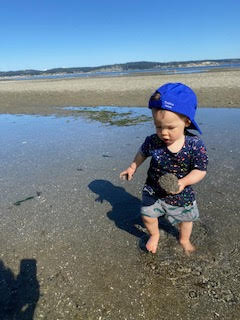
Mount Rainier at sunrise
Can we get high on alpenglow and aspen groves? Yes—and, doctor’s orders, we should, for our own happiness, let transcendent experiences enrich our lives. When psychologist Dacher Keltner studied high school students’ experiences of awe on a white-water rafting trip, he observed biophilia, love of the natural world, in action. The teens made deep connections to their environment. One student commented, “What’s cool about awe is that it literally blows your mind!”
Keltner noted, “In various studies we’ve asked people, ‘What’s running through your mind when you feel awe?’ And they’ll say things like ‘I want to make the world better,’ or ‘I just feel like being quiet,’ or ‘I feel like purifying things.’ It makes you humble. It makes you curious about the world.” Awe, attention, and appreciation are good medicine for what ails us.
The humbling emotion of awe is most often elicited by raw nature, elevating our well-being, and sometimes even revising our assessments of the world. It is an energized pleasure that seems almost on the brink of fear, touched by infinity or at least something beyond us. For instance, Scott Russell Sanders wrote in A Brief History of Awe, witnessing thunderstorms provokes the feelings of awe and wonder in him.
One of my most awe-filled moments was on a twenty-mile hike on New Zealand’s Hollyford Track. The fern-choked trail led us past waterfalls, rivers, and mossy rocks as rain pattered on our yellow slickers. The deluge let up as we walked further into the beech forests of Hollyford Valley, and we felt a world away from ordinary life. But it was when we approached a rocky shore that my husband and I stopped dead in our tracks. There were Fiordland crested penguins (known as tawaki in Maori) on the beach, sporting their extravagant, yellow eyebrow feathers as they hopped from rock to rock! It was a moment I will never forget because I knew how lucky we were to see such rare birds.
My husband and I observed the penguins from afar and then continued on our way, transformed by the brief encounter. It was as if I’d seen charming creatures from a fairy tale, they were so magical. As Jonah Paquette wrote in Awestruck: How Embracing Wonder Can Make You Happier, Healthier, and More Connected, our vision expands in such moments. “By learning to see ourselves through this lens,” he wrote, “we allow ourselves to feel a sense of greater cosmic purpose, to see ourselves as a link in the chain of history, and perhaps experience a sense of awe.”
When I turn my attention to small miracles of smooth stones on the beach, pine fragrance of trees, or pink clouds at sunrise, I have gratitude. I believe in greater possibilities—and in the value of my own life. Whether or not I reach the worshipful level of awe, I take time to savor. And in savoring, I believe, lies the salvation of the world, because we take care of what we love. It’s part of what makes life worth living.







